- Home
- Gerald Hammond
Dead Weight (Three Oaks Book 11) Page 6
Dead Weight (Three Oaks Book 11) Read online
Page 6
‘Would you like me to come and be with you tonight?’ Hannah asked her.
‘Oh, would you, my dear?’ The older woman’s lip quivered. ‘I couldn’t face it alone. Alistair wouldn’t do anything like what they’re saying. He just wouldn’t. You all know that, don’t you?’
Dutifully, we all said that we did.
‘But what are they saying?’ Bruce asked. ‘Did they give anything away?’
‘That man,’ said Mrs Branch – and there was a whole world of contempt in the words – ‘he said that they had the D-something results and the post-mortem report and Alistair had some serious explaining to do.’
Bruce was frowning. ‘I thought that DNA tests took ten days or more,’ he said. ‘In fact, I was counting on it.’
I knew something about DNA tests due to the occasional paternity dispute – in connection with dogs, I mean. ‘That’s the usual waiting time,’ I told him. ‘The tests themselves don’t take long if they jump them to the front of the queue.’
‘So they treated them as urgent. I wonder why. No doubt time will tell. I’ll try to arrange bail tomorrow. They sometimes allow it, even on . . . this sort of charge,’ Bruce said carefully. The word murder was not to be bandied about in the presence of an already distraught wife. ‘But it may be difficult. Come along, ladies. We must get organized.’
‘I hate that policeman,’ Alistair’s wife said. ‘Hate him! He thinks he can just trample over everybody. And – do you know? – I’m sure I’ve met him before. His face . . . And even more his voice . . .’
After a short delay while Hannah collected her overnight necessities, Bruce carried the two women off. Beth and I were alone. We gathered the dishes. As we stood at the sink, Beth said, ‘I suppose we do know that Alistair wouldn’t do such a thing?’
‘Henry might know it,’ I said. ‘We can ask him tomorrow.’
Chapter Three
I awoke next morning with a dully aching tooth. The first contact with the cold milk on my cereal triggered an explosion of full-blown toothache. A phone call to my dentist’s number only produced the information that he was on holiday for ten more days. I took two paracetamol and got on with my life. As often as not ills cure themselves, although this is not so commonly true of teeth.
Daffy, whose husband was still at home from his oil rig, was into one of her periods of irregular working hours. Hannah, who would usually have made up for Daffy’s absence by starting with a furious burst of energy at the crack of dawn, walked in late for work in the morning, explaining that Betty Branch had been reluctant to lose her company and had found excuse after excuse to detain her. She had only escaped, Hannah explained, by promising to return that night and to send Bruce along to lend his support as soon as he was up and about.
Henry had arrived with Isobel. Even in what must surely be his twilight years, Henry’s mind was still sharp and clear; but he was past the time of life for intensive physical work, so we were glad of our helpers. Beth and I had fed the younger dogs. We left the juniors to get on with the cleaning and walking and foregathered over Bruce’s breakfast table for coffee which I dared not risk taking.
‘Human teeth are nature’s greatest failure,’ I grumbled. ‘We should have had teeth like the guinea pig’s which keep on growing and have to be cut back now and again.’
‘Some people wouldn’t bother to cut them until they were sticking out in all directions,’ Henry said. ‘Would you like me to phone my dentist?’
‘For God’s sake do,’ I said. Now, to add to my other woes, my mind was filled with pictures of my friends and acquaintances, all with teeth ‘sticking out in all directions’.
Henry phoned his dentist, who had a slot available later in the morning.
Beth put her question to Henry as soon as he was back at the table. Was Alistair the sort of person who might boil over and kill somebody?
‘Of course not,’ Henry said stoutly. ‘I’ve known Alistair for years. He’s a gentle soul, the very last I could imagine committing an act of violence. When he was in insurance, he could reject a claim or foreclose a mortgage with the best of them, but it was always done with as much consideration as circumstances permitted so that the loser ended up feeling almost as though Alistair had done them a favour. That, I think, is why he was successful – clients came back to him time and again. Not always the ones that he wanted, but business is business. Now in retirement, he has to psych himself up to complain about a poor meal in a restaurant.’
‘That’s all very well,’ Isobel said. ‘But anybody can be pushed beyond endurance. The most unlikely people do sometimes go off pop and do something out of character. And then,’ she added, ‘the neighbours all say they knew all along that he’d do something like that.’
‘Under the sort of provocation that Mrs Homer seemed to enjoy handing out,’ said Beth, ‘Mother Theresa would probably have blown her top.’
The discussion might have wandered into anecdotes about Mrs Horner’s ill-doings, but Bruce dragged it back. ‘You’re missing the point,’ he said. ‘Alistair Branch is my client and so he is definitely and absolutely as innocent as a newborn babe until proved guilty.’
I looked at him, but he was perfectly serious. ‘After which,’ I suggested, ‘he’s as guilty as hell?’
‘Not necessarily,’ Bruce said. I began to recover my respect for the legal mind but he forfeited it again. ‘Not if we decide to appeal.’
‘How does the evidence look?’ Henry asked him.
Bruce turned down the corners of his mouth. ‘It doesn’t look too good but it’s early days and they’re releasing details with all the enthusiasm of a hen laying a brick. I’m told the DNA results show that the turd came from June and the cigar stub showed traces of Mr Branch’s saliva. That went on the record, so it’s probably true.’
‘That’s rather damning, isn’t it?’ Hannah said.
‘Not necessarily. I’m hoping to find out more today. I’ll take Mrs Branch along for a visit and do some serious stirring up to see what I can find out. What do I look for in the DNA evidence, if I can get at it?’
I deferred to Isobel’s superior knowledge of biochemistry. ‘They must have been very small samples,’ she said. ‘A trace of saliva and a few cells from the wall of the anus. It’s not much to work with. Were there enough points of similarity? Like fingerprints, they need a minimum number of points of similarity to constitute proof. Offhand, I forget how many. If the sample’s small enough, they could probably find similar bits of pattern shared between almost any two examples. And, of course, the sample could be contaminated by the DNA of whatever meat went into the dog food.’
Bruce put down his cup and frowned. ‘Could it really? After passing through a dog’s digestive system?’
Isobel shrugged. ‘I haven’t the faintest idea, but you might be able to use it to shake their overconfidence.’
‘Got you. Does your child labour have anything for me?’
‘Some of them do, I believe,’ I said. ‘But I doubt if you’ll get it if you refer to them as child labour. It’s locked up in the laptop computer that Francis is carrying around most of the time. He can print it out for you in the office, if you like.’
‘I’ll have to rush,’ said Bruce, who had been taking his breakfast as though there was nothing in the world but time. I had noticed that although he was at ease with his contemporaries, he had a shyness with young people, who recognized his vulnerability immediately and, with the innate cruelty of their kind, played it up. ‘Ask Francis for me, will you, please?’
As Bruce’s car started up, I said, ‘I just don’t have time to get involved in any more investigations. And, frankly, I don’t give a damn who killed Mrs Horner as long as it wasn’t one of you. It wasn’t, was it?’
Isobel shook her head impatiently. Beth did not dignify my question with an answer. Henry said that he hadn’t thought of it.
‘I’ll have to get moving if I’m going to keep that appointment,’ I said. ‘Henry, Alistair’s your f
riend. Speak to Francis, would you? Tell him what Bruce wants.’
Henry brightened. There’s nothing he welcomes so avidly as an excuse to pry into a mystery.
A sudden pang like a hot electric worm in my tooth reminded me of my troubles. I changed into a more respectable pair of trousers and set off in the car. Rush hour was past so that there were none of the usual tailbacks around the Tay Road Bridge. I drove east, parallel to the north bank of the wide estuary, and turned down off the Arbroath road into Broughty Ferry.
I was soon able to guess why Henry’s dentist had been able to take me at short notice. She turned out to be a capable and not unattractive young woman. The more old-fashioned Scots hesitate before trusting a young woman, however attractive, in any of the traditionally masculine professions. I felt happy in her hands. The young make up for any lack of experience by having mastered the latest techniques; and women dentists, in my experience, are more sympathetic to the male sufferer. She had my tooth excavated and filled in short time without inflicting on me any more discomfort than the prick of a needle and, with a few words about coming back if it gave me any further trouble and to try to chew on the other side that day, she sent me out into a brighter and altogether better day.
On my way to the dentist from where I had parked the car, I had been too distracted to pay much attention to my surroundings. Now, looking around with freshly unclouded eyes, I saw that I had walked past two antique shops. One, the smaller and less prosperous looking, bore the name The Snuff Box above the window.
I paused for a look. In my fresh mood of bonhomie, I thought that I might pick up a present for Beth. As Henry had said, the window held a few good pieces. On a very handsome table were set out a Delft dish from the mid seventeenth century, a Liberty art nouveau pewter teaset and several globe-and-shaft wine bottles. But these would undoubtedly be priced higher than even my present mood would allow.
My watch told me that I could spare a few minutes so I went inside. There was nobody in the shop but I guessed that the large mirror on the far wall was probably a transparently silvered one-way mirror. Not that there was much to guard inside the shop. The stock on show was mostly little better than rubbish. The one good piece was a chest, apparently of walnut. Out of curiosity, I opened a drawer. As I thought, oak.
‘You’re quite right,’ said a voice behind me. ‘It’s been veneered, probably during the twenties.’ I turned to find a woman closing the back-shop door behind her. ‘Why, it’s Mr Cunningham!’ she said.
‘Judith Tolliver!’ I replied. The numbness in half my face distorted my voice but I thought that she would probably recognize her own name. ‘I didn’t know that you were in the antiques . . .’ I nearly said racket, then trade, but finished . . . ‘business.’ Judith was in her late thirties, tall, slim and dark. Her looks were good, only flawed by bushy eyebrows which she adamantly refused to pluck. She and her husband had lived in the village until he was killed one winter night when an oncoming car had skidded on a surface of polished snow and slammed into him. Ironically, the other driver had escaped with minor scratches. Beth and I had exchanged invitations with the Tollivers on occasion and I remembered that their house had been furnished very tastefully with what Judith told us was a mixture of genuine antiques and reproductions. She was a born chatterbox but otherwise charming.
‘When Jim died,’ she said simply, ‘I was left with very little money, a nice house and some good antiques. That’s how I came to meet Roley Bovis. I was just making coffee. Would you like a cup?’
‘Yes, I’d love a cup. I’ve just been to the dentist,’ I said, ‘but if I scream and rush outside you’ll know that the anaesthetic has worn off suddenly.’
She took me into an office where we sat on either side of a battered desk on chairs which creaked mournfully. As I had thought, we had a view of the shop through the mirror. She poured coffee from a modern percolator. ‘If your mouth’s still numb,’ she said, ‘be careful not to burn yourself.’
‘I can manage,’ I said. ‘I have feeling on one side. Of course, I remember now. Mr Bovis bought your house.’
‘He saved my bacon, financially speaking. He got me this job and they let me sell my better bits and pieces through the firm on commission. I have a small flat near the Lifeboat Station with a view across to Tentsmuir and I get by.’
The coffee was delicious, more so because I had not managed to take much breakfast. ‘Do you enjoy the job?’ I asked her.
She shrugged. ‘I know something of antiques and I’m learning all the time. I think I have a knack for selling.’
Something in her voice made me say, ‘But?’
‘But I don’t know how long it’ll last. Ian Shute’s the businessman and we do the selling between us. Sometimes people walk in off the street with something to sell, but Roley Bovis does the rest of the buying and sometimes he gets caught out.’
‘Fakes?’ I suggested.
‘Sometimes. And he spent the earth on a Minton royal service from Balmoral which turned out to have been stolen. I shouldn’t be telling you all this.’
It was my turn to shrug. ‘I could have guessed most of it from the contents of the shop,’ I said. I could visualize the unhappy picture. Credit already overextended, the few good pieces marked too high because cash was needed. ‘You may be able to buy your old house back cheaply.’
‘I wouldn’t mind that,’ she said, ‘now that the old witch is dead. I felt guilty – would you believe? – selling the house to Roley without telling him of the awful neighbour, but as it turned out they got along like two lovebirds. Even at the time of the bust-up . . .’
‘When Mrs Bovis walked out?’ I asked.
‘There was a bigger one than that. Mrs Horner brought in a pair of fake Georgian candlesticks, her one heirloom. We got her quite a reasonable sum for them, but she’d convinced herself that they were genuine and that there should have been another nought on the end. In fact, Roley had taken them to an auction for her; but nothing would suit her better than to blame Ian and me. Then, when Helena Bovis decided to change partners for the dance of life and moved in with Ian, Mrs Horner took Roley’s side against her own nephew. From what I heard, she was much more indignant than he was. In fact, he was more relieved than anything.’
I had to wait, nursing my still hot mug of coffee, while she went into the shop and sold a brass door knocker to a pair of holidaymakers. When she settled again she said, ‘The papers hinted that the police suspect foul play.’
While I had the ear of one who knew the inner circle so intimately, I could hardly turn my back. ‘It’s gone a bit further than that,’ I said. ‘They’ve arrested Alistair Branch.’
‘Oh no!’ She seemed genuinely horrified. ‘That nice old man! Did he do it?’
‘None of us believe so.’
‘And no more do I. But I suppose . . .’
‘What do you suppose?’ I asked.
‘I suppose,’ she said, frowning, ‘that Ian would have been a more logical suspect if he hadn’t been out of the country. They’re sailing in the Adriatic, did you know?’
‘So I hear,’ I said.
‘Well, it’s true. He phoned from Venice on Saturday morning to ask whether I thought we should stock Venetian glass. I said that we have good crystal in Scotland, lower priced than Venetian. After all, we aren’t having to pay for keeping Scotland from sinking slowly beneath the waves.’
Before I left, she sold me a nice little Victorian brooch for Beth and sent her her love.
*
I spent what was left of the working day shuttling to and fro between the kennels and the wood with a series of dogs, either our competition hopefuls or those who would be offered for sale as fully trained for the approaching season. I deafened myself firing dummies from the launcher and I blew my whistle until my lips chafed, but whenever I came back to the house I could hear the voices of Francis and Henry in deep discussion.
By late afternoon I was weary but pleased with the afternoon’s progress. I le
nt a hand with the animals’ evening meal and gave Mrs Horner’s cat some food and a few minutes of companionship. She had stopped scratching, so either Isobel had worked her usual magic or the old cat had decided that the effort of scratching was more bother than the occasional itch. When I headed for the house I saw Bruce’s car outside the front door. I sneaked in quietly. I was hot and leg-weary after so much exercise in close weather, my cotton shirt was sticking to me and the anaesthetic was wearing off. I wanted little more out of life than a shower and a change of clothes, to be followed by a cold drink taken sitting down.
I came downstairs twenty minutes later, already partially refreshed, and headed for the sitting room. Bruce and Henry were in possession, hunched over a drift of small papers on the coffee-table, but I was not going to be kept out of my own sitting room and away from my own drink by visitors. I helped myself to a can of beer, sat down and poured.
‘Is it that time already?’ Henry asked brightly.
I sighed. I might be refreshed but I was still physically weary. ‘Help yourselves,’ I told them. ‘I wasn’t going to disturb you.’
‘We noticed,’ said Henry. ‘Go ahead and disturb us. We’ll forgive you.’
I settled back in my chair. ‘Did the responsible young citizens who you lightly refer to as child labour produce anything useful?’ I asked.
Bruce got up to do the honours. As he poured he said, ‘Observation seems to have been remarkable for its absence, but having had a good look around I can guess why.’
I thought that I could see what he meant. ‘The local shop only keeps tobacco and magazines and a few essentials like bread, milk and eggs,’ I said. ‘So, on Saturday mornings, most families go to do the week’s shopping in Cupar or Dundee. Or the husbands may go golfing or sailing. In this heat, there was probably an exodus to the beach at Tentsmuir. The place was as quiet as a morgue.’
‘So the place was half empty,’ Bruce said. ‘It was also half full. But those who were still here were mostly hugging the shade. And even that isn’t the whole explanation. I never noticed before, but when the leaves are on the trees you can hardly see the houses in Old Ford Road and those houses look over the Moss at the front and farmland at the back. Old Ford Road only has houses on the right as you enter it and the road curves to the right. The plots are big and there are trees along most of the boundaries, so they’re mostly hidden from each other at the front. Across the road there are more trees and the bank down to the burn. At the rear it’s more open after the wall round Mrs Horner’s garden – beyond that it’s all clipped hedges and a fence to the track along the edge of the field.

 Home to Roost
Home to Roost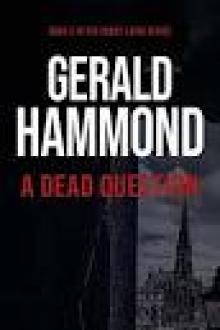 A Dead Question
A Dead Question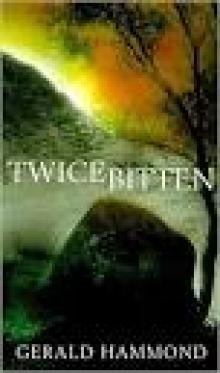 Twice Bitten
Twice Bitten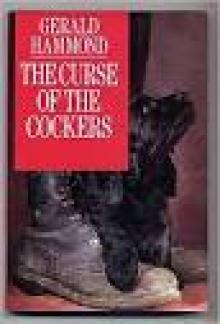 The Curse of the Cockers
The Curse of the Cockers In Loving Memory
In Loving Memory Illegal Tender (Three Oaks Book 12)
Illegal Tender (Three Oaks Book 12) Cold Relations (Honey Laird Book 1)
Cold Relations (Honey Laird Book 1)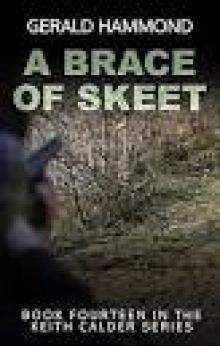 A Brace of Skeet
A Brace of Skeet Silver City Scandal
Silver City Scandal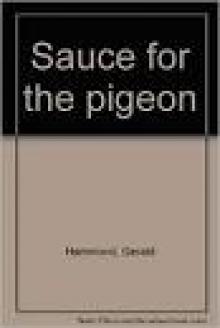 Sauce For the Pigeon
Sauce For the Pigeon Cold Relations
Cold Relations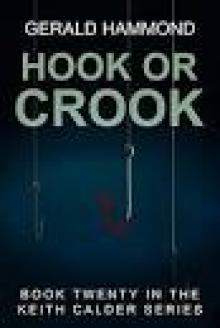 Hook or Crook
Hook or Crook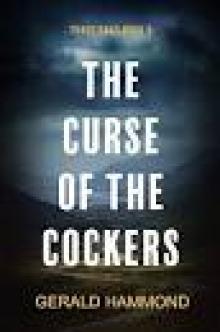 The Curse of the Cockers (Three Oaks Book 5)
The Curse of the Cockers (Three Oaks Book 5)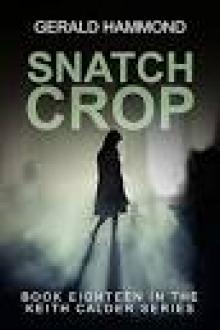 Snatch Crop
Snatch Crop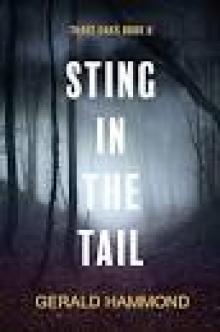 Sting in the Tail (Three Oaks Book 6)
Sting in the Tail (Three Oaks Book 6)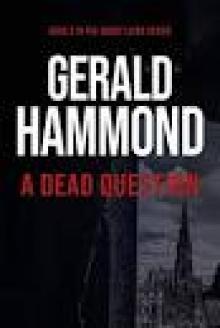 A Dead Question (Honey Laird Book 2)
A Dead Question (Honey Laird Book 2)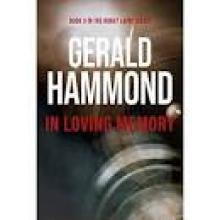 In Loving Memory (Honey Laird Book 3)
In Loving Memory (Honey Laird Book 3) Thin Air
Thin Air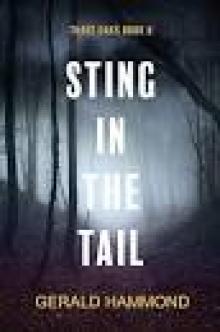 Sting in the Tail
Sting in the Tail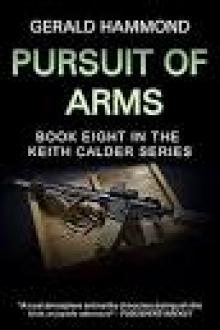 Pursuit of Arms
Pursuit of Arms The Game
The Game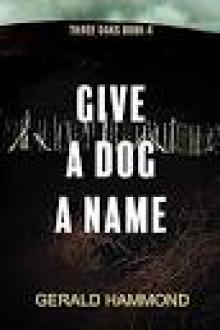 Give a Dog a Name (Three Oaks Book 4)
Give a Dog a Name (Three Oaks Book 4) Fair Game
Fair Game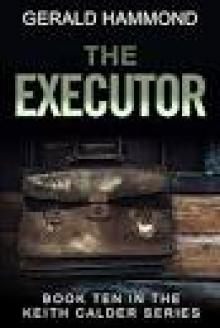 The Executor (Keith Calder Book 10)
The Executor (Keith Calder Book 10) Whose Dog Are You? (Three Oaks Book 2)
Whose Dog Are You? (Three Oaks Book 2)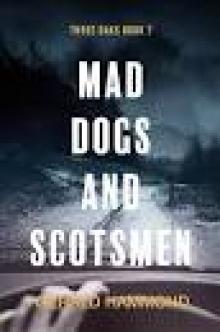 Mad Dogs and Scotsmen (Three Oaks Book 7)
Mad Dogs and Scotsmen (Three Oaks Book 7) Cousin Once Removed
Cousin Once Removed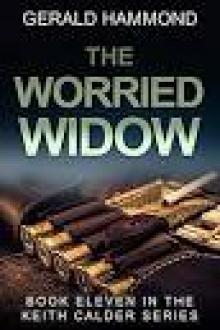 The Worried Widow
The Worried Widow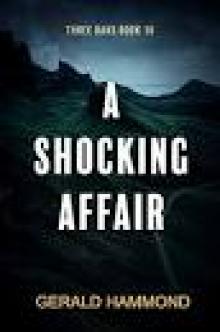 A Shocking Affair
A Shocking Affair Dead Weight (Three Oaks Book 11)
Dead Weight (Three Oaks Book 11) Whose Dog Are You
Whose Dog Are You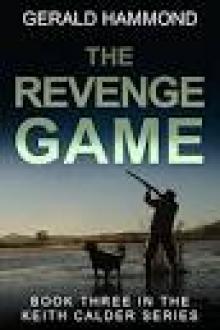 The Revenge Game
The Revenge Game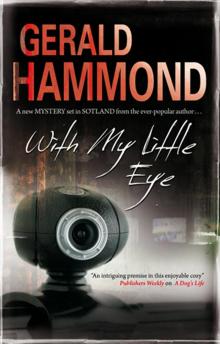 With My Little Eye
With My Little Eye Doghouse (Three Oaks Book 3)
Doghouse (Three Oaks Book 3)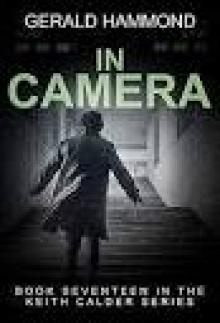 In Camera
In Camera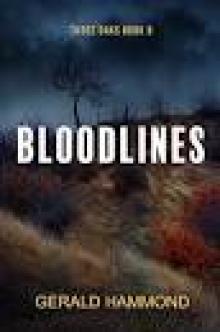 Bloodlines (Three Oaks Book 8)
Bloodlines (Three Oaks Book 8)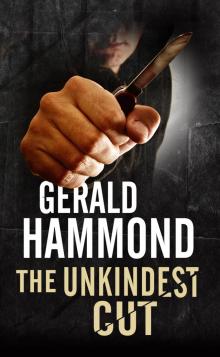 The Unkindest Cut
The Unkindest Cut